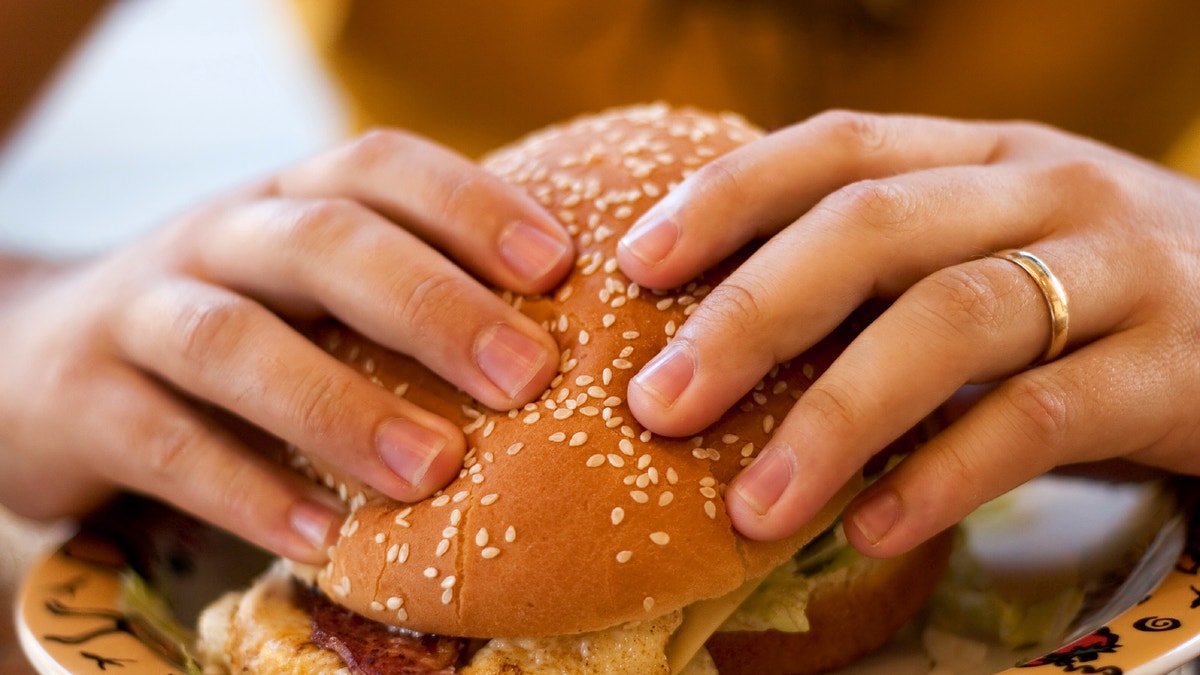
Whether your thing is a bacon cheeseburger, a slice of chocolate cake or a bowl of pasta, we all love to indulge. And if you’re being honest, you’ve probably found yourself overeating on more than one occasion. Sweet, salty, or savory— you just can’t get enough.
But how do you know if your love for food is really a food addiction? Here, experts explain what distinguishes an overeater from an addict.
What is food addiction?
When we eat, the feel-good hormone dopamine, which controls the pleasure and reward centers of the brain, is released. But for people with food addiction who are overweight or obese, research shows that their pleasure centers are more active when they eat, compared to someone of normal weight.
“They experience much more food pleasure,” said Dr. Susan Albers, a clinical psychologist at the Cleveland Clinic in Ohio and author of “50 More Ways to Soothe Yourself Without Food,” a New York Times bestseller.
Food addicts become consumed with thoughts about what they will eat, how they will get it and how they will pay for it. They eat until they feel sluggish or vomit, and even though their health is suffering, they don’t know when enough is enough.
“The stop switch gets faulty and they can’t say no,” said Dr. Vera Tarman, an addiction specialist in Toronto, Ontario and author of “Food Junkies.”
People with a normal BMI can have food addiction, too, either because they compensate for overeating with exercise, restrict themselves at other times of the day or they simply have a good metabolism.
Although there are no studies on food addiction, experts believe approximately 10 to 15 percent of people with a normal BMI have food addiction while as many as 50 percent of obese individuals may have the addiction. Because of the shame and guilt that surrounds the problem, many people are undiagnosed.
Food addiction is not recognized as a disorder in the DSM-5, the handbook healthcare professionals use to diagnose mental disorders.
Plus, the term itself is controversial. This is partly because, unlike addiction to alcohol or drugs where there’s a physiological response,here,individuals have a psychological relationship with food. Food addicts who avoid their triggers won’t go through withdrawal, but they struggle with the same feelings.
“When I talk to clients and they describe their experience, it’s very similar to the language and the behaviors to other kids of addiction,” Albers said.
Binge eating disorder isn’t a food addiction.
Binge eating disorder, which is now included in the DSM-5, is similar to food addiction. With the disorder, people eat when they’re not hungry, continue to eat after they’re full or until they get sick. They may go out of their way to get certain foods and become secretive about or hide their eating.
People with binge eating disorder, however, can find ways to control their eating with support like therapy, mindfulness and meditation. But for food addicts, eating will override their efforts to stop the addiction because the food is an irritant to the brain.
“You’re putting a drug into your system that’s firing up what we call the ‘phenomena of craving,’” Tarman said.
It’s also no surprise then that food addicts will fail at any diet because eliminating the trigger foods and then re-introducing them will start the cycle all over again.
What are the risk factors?
Just as it isn’t entirely clear why someone becomes an alcoholic, experts aren’t sure what the driving force behind food addiction is.
It may be genetic— studies show that drug addicts and obese people show an altered expression of the dopamine 2 receptor in specific brain areas.
Easy— and constant— access to food, particularly processed foods, is also a factor.
“We have all of these potential food addicts who wouldn’t have become food addicts, except now we’re in a toxic food environment,” Tarman said.
How to get help:
If you think you have a food addiction, there are ways to find help.
See your doctor.
Have your doctor run blood tests to check your blood sugar, cholesterol and potassium levels. A dietitian can also help you choose foods and food combinations that will reduce cravings and the likelihood that you’ll overeat.
Seek therapy.
The only way to stop the food addiction cycle is to eliminate the trigger foods for good. A therapist who specializes in food addiction can help. Try EDreferral.com, the Renfrew Center or National Eating Disorders Association.
“Like any other substance, after you stop the desire starts to get less and less,” Tarman said, adding that people tend to lose the weight and keep it off.
Although the withdrawal symptoms aren’t as serious as drug withdrawal, it’s common to have headaches, anxiety, irritability, depression, sleepiness or insomnia or to experience extreme temperature fluctuations
Try mindfulness.
Once the food triggers have been eliminated, a mindfulness practice can also help.
“Teaching people how to use mindfulness to ride out the craving and get to the other side of it without responding to it is key,” Albers said.




















